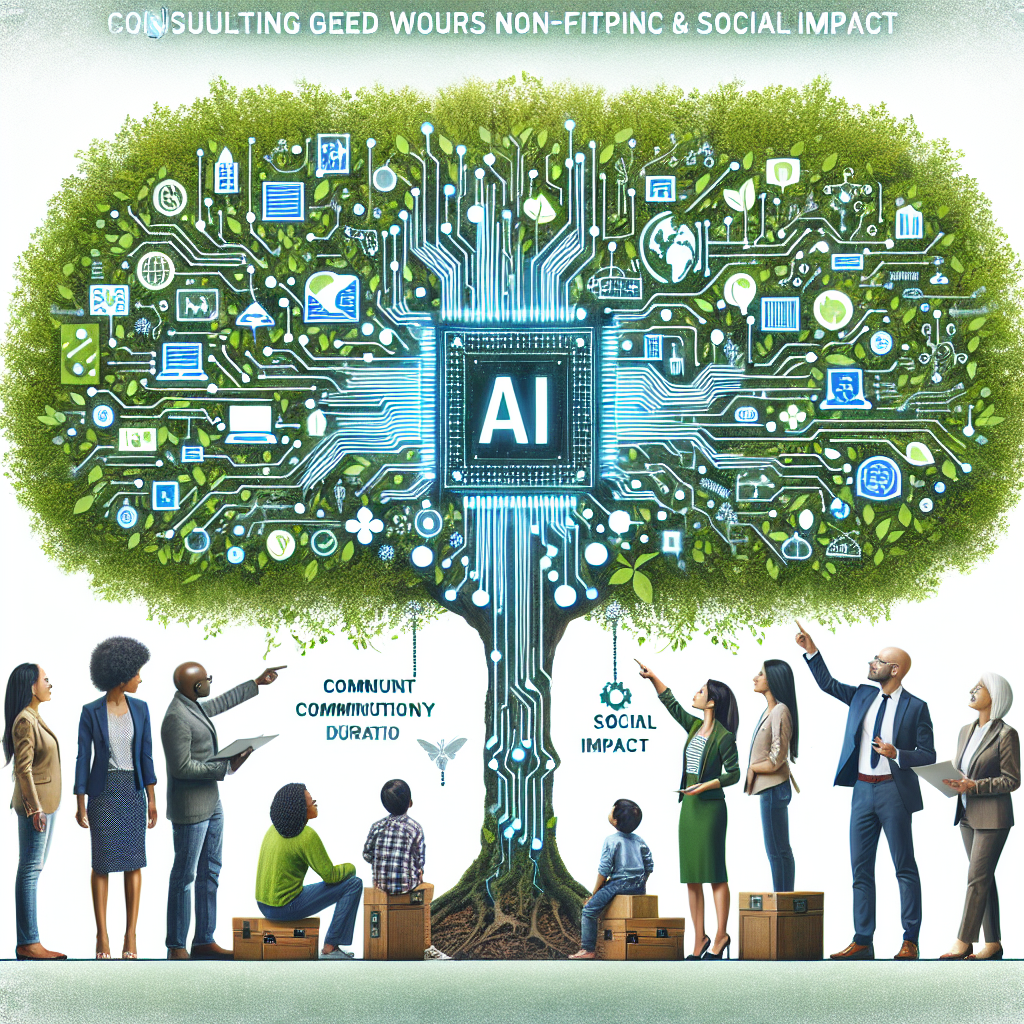Artificial Intelligence (AI) is a powerful tool that has the potential to revolutionize the way non-profit organizations address social issues and create positive social impact. AI consulting for non-profits can help these organizations leverage technology to optimize their operations, improve decision-making, and enhance their ability to serve their communities. In this article, we will explore the benefits of AI consulting for non-profits, as well as some common misconceptions and frequently asked questions about implementing AI in the non-profit sector.
Benefits of AI Consulting for Non-profits:
1. Data Analysis and Insights: AI can help non-profits analyze large amounts of data to gain valuable insights into their programs, services, and impact. By using machine learning algorithms, non-profits can identify trends, patterns, and correlations in their data that can inform strategic decision-making and drive more effective interventions.
2. Personalized Services: AI can enable non-profits to deliver more personalized services to their beneficiaries. By using predictive analytics and recommendation engines, non-profits can tailor their programs to meet the specific needs of each individual or community they serve, leading to better outcomes and increased impact.
3. Automation of Routine Tasks: AI can automate repetitive and time-consuming tasks, freeing up staff members to focus on more strategic and creative work. Non-profits can use AI-powered chatbots, virtual assistants, and other tools to streamline administrative processes, improve communication with stakeholders, and enhance the efficiency of their operations.
4. Improved Fundraising and Donor Engagement: AI can help non-profits optimize their fundraising efforts and enhance donor engagement. By using AI to analyze donor data, predict donor behavior, and personalize fundraising campaigns, non-profits can increase donations, attract new supporters, and build stronger relationships with their donors.
5. Enhanced Program Evaluation and Monitoring: AI can support non-profits in evaluating the impact of their programs and monitoring their progress towards achieving their goals. By using AI to track key performance indicators, measure outcomes, and assess the effectiveness of their interventions, non-profits can make data-driven decisions to improve their programs and maximize their social impact.
Common Misconceptions about AI in the Non-profit Sector:
1. Cost: One common misconception about AI consulting for non-profits is that it is too expensive and out of reach for organizations with limited resources. While AI implementation can require an initial investment, there are a growing number of affordable AI solutions and consulting services available to non-profits, including pro bono support from tech companies and AI experts.
2. Complexity: Another misconception is that AI is too complex and requires specialized technical expertise to implement and use. While AI technology can be complex, there are user-friendly AI tools and platforms that non-profits can use without extensive technical knowledge. Many AI consulting firms also offer training and support to help non-profits navigate the complexities of AI implementation.
3. Ethical Concerns: Some non-profits may have concerns about the ethical implications of using AI in their work, such as data privacy, bias, and transparency. While these are valid concerns, there are ethical guidelines and best practices for AI development and deployment that non-profits can follow to ensure that their use of AI is responsible and ethical.
Frequently Asked Questions about AI Consulting for Non-profits:
Q: How can AI help non-profits improve their impact measurement and evaluation?
A: AI can help non-profits collect, analyze, and interpret data to measure the impact of their programs and services more accurately and efficiently. By using AI tools for impact measurement and evaluation, non-profits can track outcomes, assess effectiveness, and make data-driven decisions to improve their social impact.
Q: What are some examples of AI applications in the non-profit sector?
A: Some common examples of AI applications in the non-profit sector include predictive analytics for fundraising, chatbots for customer service, image recognition for disaster response, and natural language processing for data analysis. Non-profits can also use AI for program optimization, volunteer management, and social media outreach.
Q: How can non-profits get started with AI consulting?
A: Non-profits interested in AI consulting can start by researching AI solutions and consulting firms that specialize in working with non-profits. Many AI consulting firms offer free consultations and assessments to help non-profits understand their needs and develop a customized AI strategy. Non-profits can also reach out to tech companies, universities, and AI experts for pro bono support and resources.
Q: What are some best practices for implementing AI in non-profit organizations?
A: Some best practices for implementing AI in non-profit organizations include conducting a needs assessment to identify key challenges and opportunities, involving stakeholders in the decision-making process, ensuring data privacy and security, and providing training and support for staff members. Non-profits should also establish clear goals and metrics for their AI initiatives and regularly evaluate their progress and impact.
In conclusion, AI consulting offers non-profit organizations a valuable opportunity to harness the power of technology to create positive social impact and drive meaningful change. By leveraging AI tools and expertise, non-profits can improve their operations, enhance their services, and maximize their effectiveness in serving their communities. While there may be challenges and misconceptions about AI in the non-profit sector, with the right support and guidance, non-profits can successfully integrate AI into their work and achieve their mission more effectively.

